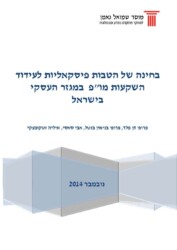“כיצד מתמרצים מחקר ופיתוח בעולם, ומה על ישראל לעשות על מנת להתאים עצמה לתחרות הגלובלית המתעצמת בתחום זה?” עבודה זאת בוחנת לראשונה בישראל את הכדאיות של הנהגת ערוץ תמיכה נוסף לעידוד השקעות במחקר ופיתוח באמצעות מתן זיכוי מס על חלק מהוצאות המו”פ של החברות העסקיות. שיטת עידוד זאת נהוגה במרבית מדינות ה- OECD, ויתרונה העיקרי קשור בפשטותה. התמיכה נעשית על בסיס נתוני מס עליהם מדווחות החברות העסקיות ממילא, ואינה כרוכה בבחינה טכנית ובהליכי שיפוט ומיון של הפרויקטים בגינם ניתנת ההטבה.
העבודה כוללת סקירת ספרות מקיפה על השיטות המקובלות בעולם לסבסוד מו”פ, ועל האפקטיביות של תמיכות כאלה. העבודה מציגה אומדן פשוט להשפעה של תכנית העידוד המוצעת באמצעות מודל לינארי של הקשר בין ההשקעה במו”פ ותפוקות כלכליות ברמה הענפית. הפעלת מקדמים שנאמדו בארצות אחרות על נתוני המשק הישראלי מוליכה למסקנה שבטווח הארוך שקל הניתן לסקטור העסקי כהטבת מס על ההשקעות במו”פ ייצר בישראל בין 1.3 ו-2 שקלים נוספים של תפוקה. במונחי תשואה על השקעה, מספרים אלה שקולים לשעורי תשואה שנתיים מרשימים של 30% עד 100%.
התשואות לסבסוד מו”פ המתקבלות במודל גבוהות יותר בענפים בעלי עצימות מו”פ נמוכה יותר. אין בכך להמעיט בחשיבות ענפי הטכנולוגיה העילית והעילית-מעורבת, בהם שעור הוצאות המו”פ מהתפוקה גבוה על פי הגדרה. עם זאת, נראה שלאור היקף המו”פ הגבוה בענפים אלה הם אינם זקוקים לעידוד נוסף באותה מידה כמו ענפי הטכנולוגיה מעורבת-מסורתית ומסורתית, שחלקם בפעילות הכלכלית (תפוקה ותעסוקה) גדול יותר.
החוקרים מאמינים שתכנית זיכוי המס המוצעת תעודד פירמות בענפי הטכנולוגיה המסורתית והמסורתית-מעורבת, בהן המו”פ לא היווה עד כה חלק אינטגרלי מהאסטרטגיה העסקית, להשקיע במחקר ופיתוח. התפתחות זאת תהווה שיפור משמעותי בפריון המשק הישראלי וביכולתו להתמודד בהצלחה עם אתגרי הכלכלה הגלובלית. בהתאם אנו מציעים לשקול הוספת מסגרת זו לעידוד מו”פ, וזאת בלי לפגוע בתכניות העידוד הקיימות.


